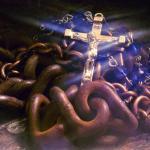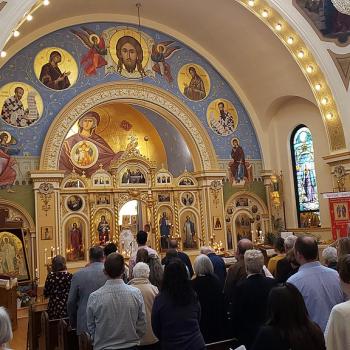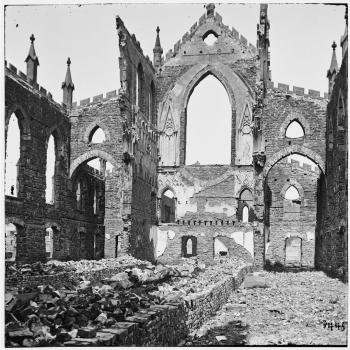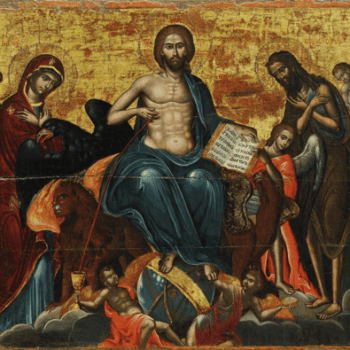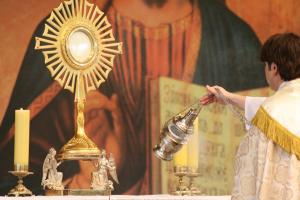
We must be careful and not confuse the external form of the church, the church as it exists in the world throughout history, and the structures it uses to establish its place in the world, as being what the church is. The institutional church is important, and it needs rules to help fulfill its task, but those rules and its actions in history can be and are influenced by human conventions and cultural expectations and norms, elements which have nothing to do with the essence of the church itself. Indeed, sometimes, they are all too human, bringing not just the human element, but sin, into the church (such as happened with the abuse crisis). Thus, while the essential, inner nature of the church can be and is reflected in the institutional church, it is not limited to that historical manifestation, and sometimes, it gets hidden by the imperfections of the institutional church. We must remember, at its basis, the church transcends time and space, and all who are members join in with Christ’s priesthood, as Bulgakov said:
True, to organize this universal priesthood the New Testament Church too has an established structure, which has arisen in history in the form of different hierarchical levels, with the episcopate at the head. But this hierarchy arises only on the basis of the universal priesthood, in which Divine-humanity as the priesthood of Christ is expressed. The universal priesthood is the primus (the first condition) of the episcopate, not vice versa. [1]
Bulgakov is clear, the institutional church, while it has its value which should not be ignored, is not absolute: “The most important truth that follows from this fact is that the hierarchical-sacramental organization is not the adequate or absolute manifestation of the Church, that this organization therefore has a certain relative character.” [2]
This is why Vatican II was right to point out the church of Christ subsists in the institutional Catholic Church, to make sure that people do not confuse the historical institution, and all it has done in history, as being univocal with the church of Christ, while also, making sure the two are not seen as absolutely distinct either.
The church is not by its nature political, though, in its historical reality, it will engage politics, both in the world, but also within itself, using whatever form of political action is expedient and beneficial. Sometimes it will do so through a more democratic approach (such as through church councils and synods), and sometimes through a more direct hierarchical approach, as when a bishop, or the Pope, uses their authority to help guide the church in a time of need. But, as those relate to the institution, and the institutional authority, we need to understand their limitations and do not assume any way the institutional church exercises its authority is indicative of the inner, essential nature of the church. Thus, we should understand why the church is not a democracy, even if at times, it engages democratic ways, while also understanding it is not a monarchy, either:
Let us also be responsible. The Church is not a “democracy” in the human sense. It respects the particular and unique authority of the bishops, without whose sanction no decision can be considered final. But it is not a “monarchy” either, because the bishops’ authority is an authority “in” the Church and not “over” the Church.[3]
As the church is the body of Christ, and the eucharist is the sacramental presence of the body of Christ in the world, the church and the eucharist are one. The nature of the church is far better understood by communion rather than by the institutional hierarchy and power structure that hierarchy creates. This is why it often is said that the basis of the sacraments can be found in and with the eucharist, a saying which applies to the sacramental priesthood and the hierarchy which develops from it:
Thus, originally, in the apostolic age, the Divine Eucharist as the basis of all the sacraments was exclusively that which it is as the realization of the body of the Church as the body of Christ. Its essential character was not hierarchical but koinonic. [4]
When we read Jesus talking about how Christians (or humanity) are called to be one, called to unity, he never does so by suggesting it is established in and through some hierarchical structure, but rather, he says that unity should be had as a reflection of the unity which exists between the persons of the Trinity: that would mean each person is equal to each other, and none of them are seen as higher or greater than any others. Similarly, Paul also talks about the kind of unity Christians should have by pointing out how all of them become equal in Christ, with all worldly distinctions used to deny such equality shown to be irrelevant. That is, in Christ Jesus there is neither male nor female, Jew or Gentile, or any other accidental form, which can and should be used to suggest one person is greater or less than another. We are all to be one in Christ, bound by love, even as the persons of the Trinity are united and relate with each other through love. And because worldly power tends to form hierarchies which undermine this equality, historically, God has been at work inverting worldly hierarchies so as to elevate those who have been denied their equal worth and dignity:
God’s special solicitous attention is directed toward the weak and the poor. Memory of the fact that Israel itself was poor in Egypt (Exod 22:20; Deut 10:19; 24:22) and that God led his people out of Egypt with his mighty arm and saved them (Exod 6:6; Deut 5:15) continues to have an effect. In the promised land, God’s special love and care were applied to the poor and the weak. It is especially evident in the command not to oppress the poor or exploit aliens, widows, and orphans (Exod 22:20-26); it is also evident in the protection of the poor in court (Exod 23:6-8) and in the prohibition of usuary (Exod 22:24-26). The Book of Leviticus knows a distinctive social legislation (Lev 19:11 -18; 25). With God the normal social hierarchy is virtually inverted. [5]
We must, therefore, acknowledge that in history, the church will take on a form, with a structure, so that it can deal with the needs of people where they are at. The institutional church is important, and the rules it establishes have value, but that value is one of a relative, not absolute good. What we see established in and through the institutional church is only a manifestation of the church of Christ. The church of Christ subsists in it but is not univocal with it. Part of the institutional church, therefore, is essential in nature, but another part is accidental. How the institutional church realized itself in history must not be seen as the only way it can manifest itself. Indeed, if we examine the history of the institutional church, we will find that it is in constant development. Its hierarchical structure and the rules or disciplines it uses has changed throughout time, and will likely continue to change until the end of time. There are, to be sure, elements which have not had many changes, and as such, represent something more fundamental than those which have consistently changed, but they still must be understood as existing on the side of the institutional church.
[1] Sergius Bulgakov, Bride of the Lamb. Trans. Boris Jakim (Grand Rapids, MI: William B. Eerdmans Publishing Company, 2002), 280-281.
[2] Sergius Bulgakov, Bride of the Lamb, 274.
[3] John Meyendorff, Vision of Unity (Crestwood, NY: St. Vladimir’s Seminary Press, 1987). 114.
[4] Sergius Bulgakov, Bride of the Lamb, 287.
[5] Walter Kasper, Mercy. Trans. William Madges (New York: Paulist Press, 2013), 56.
Stay in touch! Like A Little Bit of Nothing on Facebook.
If you liked what you read, please consider sharing it with your friends and family!
N.B.: While I read comments to moderate them, I rarely respond to them. If I don’t respond to your comment directly, don’t assume I am unthankful for it. I appreciate it. But I want readers to feel free to ask questions, and hopefully, dialogue with each other. I have shared what I wanted to say, though some responses will get a brief reply by me, or, if I find it interesting and something I can engage fully, as the foundation for another post. I have had many posts inspired or improved upon thanks to my readers.



